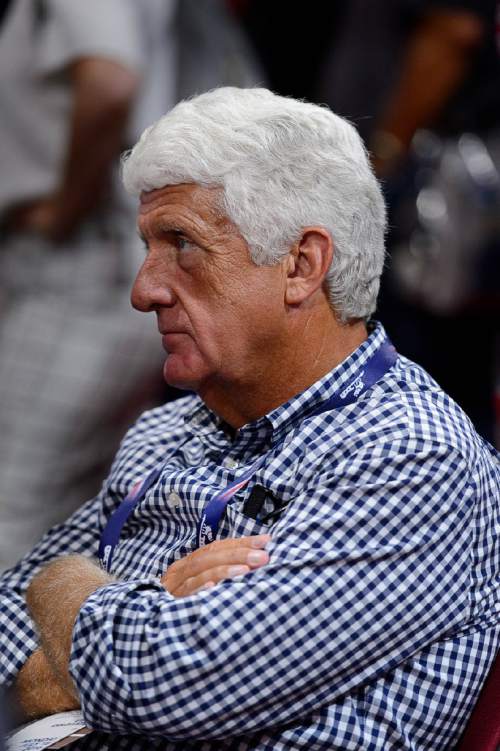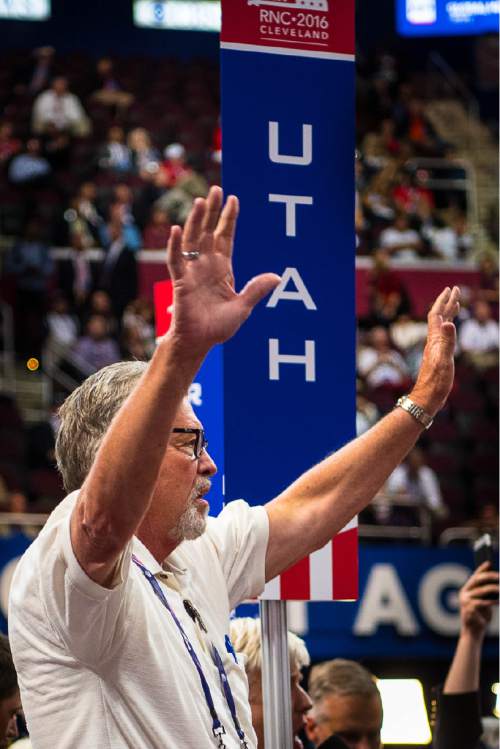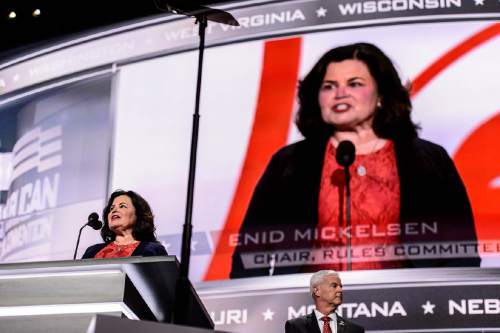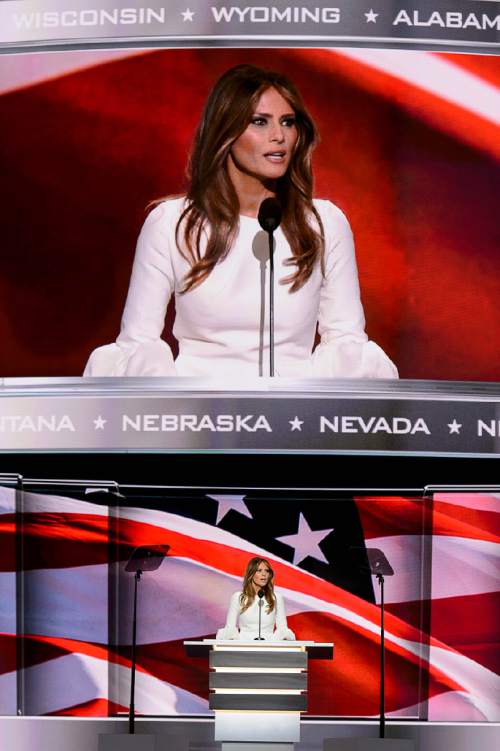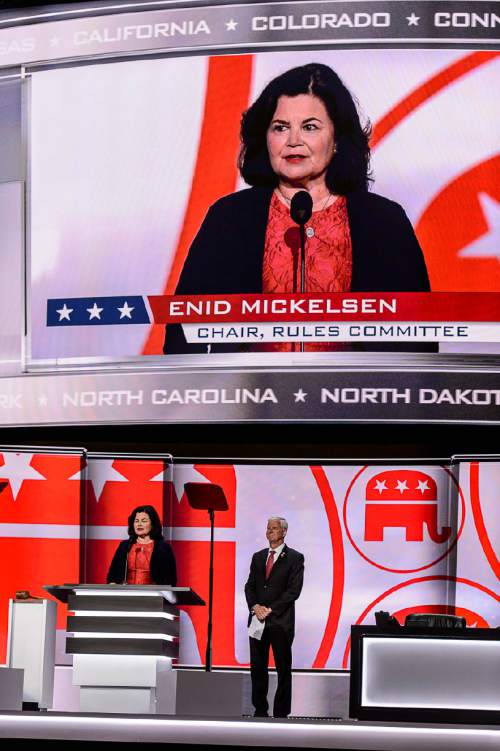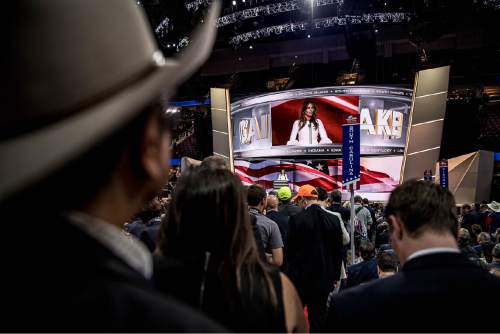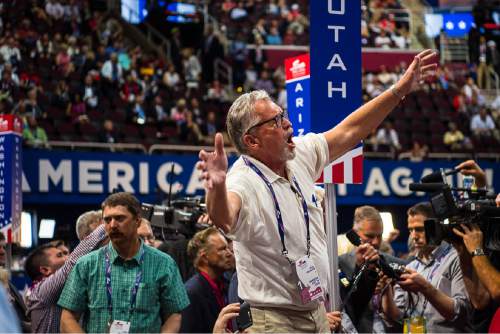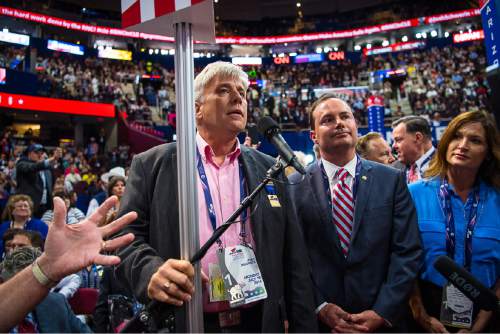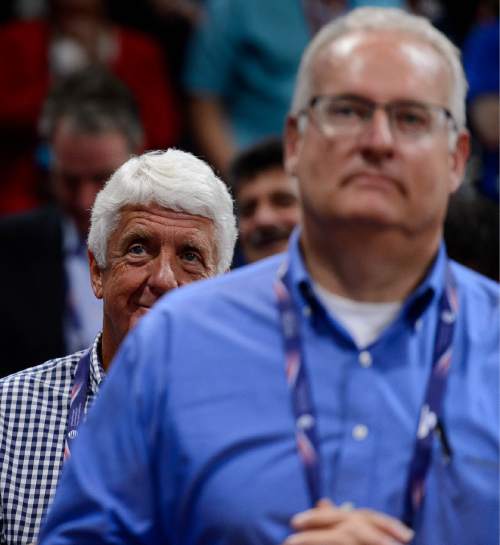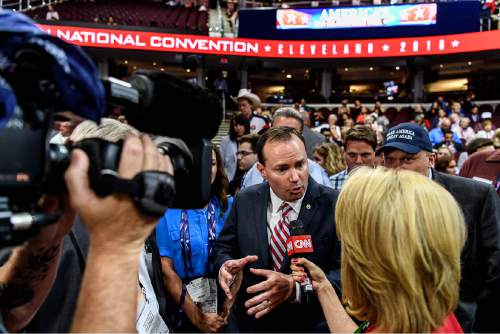This is an archived article that was published on sltrib.com in 2016, and information in the article may be outdated. It is provided only for personal research purposes and may not be reprinted.
Cleveland • Sen. Mike Lee and Utah's GOP delegates were at the center of a raucous but failed rebellion and last-ditch bid to potentially stop Donald Trump from becoming the Republican Party's presidential nominee.
The renegade effort succeeded in illustrating just how divided the party remains over Trump's candidacy, leading to competing chants of "We Want Trump" and "Roll call vote," while the delegations from Colorado and Iowa walked out in protest.
The chaotic effort erupted after convention chairman Steve Womack, an Arkansas congressman, refused to recognize Utah delegation chairman Phill Wright as he demanded a roll call vote on the rules and then walked off the stage to roars of protest from Utah and other delegates.
"Turn on the mic!" Wright shouted, alongside Lee and his wife, Sharon, who were members of the Rules Committee. "You are ignoring delegates who have been elected to represent the 50 states!"
"I can't fathom what they are thinking," an angry Lee told reporters after being denied a chance to speak. "Those who are calling for unity, keep that in mind. If what they want is unity, treat us with respect. … We are now in uncharted waters."
He also described the scene as "surreal."
The chairman of the convention returned, this time recognizing Wright, who demanded the roll call vote.
A majority of the delegates in nine states — including Utah — had signed petitions demanding a roll call vote in a move aimed at opening the door to the convention considering other candidates. But Republican National Committee staffers worked furiously to persuade delegates to withdraw their names from the petitions.
In the end, the effort worked, as enough delegates withdrew that three of the nine state petitions were rescinded and two additional petitions that were submitted were deemed to have been turned in too late, leaving the anti-Trump forces short of the seven states needed to force a vote.
Lee made futile efforts to demand to know which states withdrew, but was ignored by the chairman.
"It's strange this is a political convention. People have taken time off from work, they've come from all over the United States to be here," Lee said. "People can be unheard anywhere. … They don't travel hundreds or thousands of miles to be unheard at their own party's national convention."
Presumptive Democratic nominee Hillary Clinton sought to seize on the dissension in the Republican ranks, tweeting a video of former Utah Congresswoman Enid Mickelsen, who led the convention rules committee, addressing the convention and the ensuing chaotic scene, sarcastically captioned: "Today's [RNC] theme: "Law and Order."
Trump campaign manager, Paul Manafort, later told MSNBC's Chuck Todd that the floor fight "wasn't a rebellion" and dismissed the idea that the image of party infighting would hurt his candidate.
Utah delegate Gayle Ruzicka, who had spent the morning collecting signatures from the state's delegates supporting a roll call vote on rules, said 28 of the 38 Utah delegates who are in Cleveland signed the petition and none changed their votes, despite pressure from Republican officials.
"Shame on the Republicans for acting this way," Ruzicka said. "We're all Republicans and we should be treating each other with respect, not putting each other down."
Delegate Selma Sierra said she was approached by an RNC official in a green hat who started chatting about a woman speaking at the podium.
"All the sudden, he drops the question: 'Can you remove your name from the petition you just signed?' And I said no. I've been loyal to the Ted Cruz campaign from Day One," Sierra said. "What I should've asked him is why they want to suppress a vote."
Delegate Kera Birkeland said she was also asked why she had put her name on the petition and explained that Ted Cruz had won in Utah and Birkeland was elected to represent Utah.
"Although the party will probably choose Trump and should choose Trump, I think the party needs to consider what happened four years ago with the Ron Paul delegates," she said. In the 2012 convention, about 300 Paul delegates walked out of the convention in protest over rules that shut them out.
The party official "disagreed and believed it would embarrass Donald Trump," Birkeland said. "I think it would show the party and people are more important than him being embarrassed."
Lt. Gov. Spencer Cox said the roll call might not have changed the outcome, but would have given delegates a voice.
"I think it would have helped to legitimize what's happened here today," Cox said. "Any time you don't let people speak their mind they leave feeling like there's a lack of legitimacy to the process and that's concerning."
One of the states that joined Utah in demanding a roll call vote was Virginia and John Fredericks, vice chairman of the Trump campaign in Virginia, said efforts to chip away support fell two votes short. But it didn't matter.
"We won, they lost. Again," he said. "They were so demolished now it's just becoming an embarrassment. This was never about rule changes for the grassroots. That was a complete ruse, a gimmick in an effort to get a vote from the floor to unbind the delegates. This was all poppycock they concocted to try to find a way to embarrass Mr. Trump."
Before the eruption on the floor, Mickelsen said in an interview that unbinding the delegates would essentially have wiped out the results of all the state presidential primaries and let delegates pick the nominees.
"The conscience clause was a move to turn everyone into super delegates," she said, referring to the Democratic Party officials who get special consideration in choosing the Democratic nominee. "We don't believe in super delegates. So to take all of that away from all those millions of people who voted and put it in the hands of a few hundred people who didn't like the outcome, that would not have been right."
Mickelsen's rules co-chairman, Ron Kaufman, said that "We spent 150 years getting away from smoke-filled rooms and they're going back to it."
Eric Minor, a delegate from Washington, one of the 11 states where a majority wanted the roll call vote, said that officials rigged the system to keep delegates from supporting someone other than Trump.
"That was a fix. That's all that was, pure and simple," he said. "It was absolutely outrageous. What they feared was that we were going to reject the rules … so that all these delegates who are opposing Donald Trump would oppose him on the first ballot and have a different nominee for president."
Mickelsen had been in the crossfire for the last week, refereeing the rules committee meetings leading up to the convention, but said the pressure didn't really take a toll — aside from having to stand at a podium for a 16-hour meeting.
"I knew that I was going to be fair, so all the other stuff swirling around, it isn't the first time people have said not very nice things about me. That's all right," she said.
Twitter: @RobertGehrke


